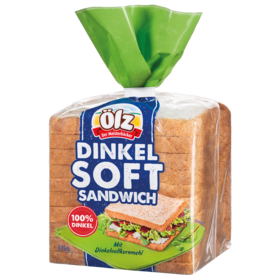Flour – the power of grains
Are you aware of all the things you find in flour?
Cereals – in the form of flour – are one of the most important sources of carbohydrates in our diet. Flour also provides us with important minerals and is an essential source of protein.
For Ölz, flour is much more – flour is our main baking ingredient: it is important to know how vital flour is and can be. Depending on the harvest year, the weather, soil conditions, number of hours of sunshine and many other natural influences, the raw material flour provides us with a different basis for our work. The Ölz master bakers know how flour has to be treated and take into account the individual nature of this valuable ingredient, which has an influence, for example, on its ability to hold water or its kneading properties. The power in the grains really packs a punch! About 20,000 wheat grains are needed for 1 kg of wheat flour.
Freshness of the flour – an essential quality criterion!
Our flour is delivered fresh several times a day (approx. 6–7 consignments) and processed the same day for the production of our baked goods. The freshness of the flour is one of the most important quality criteria to preserve the valuable components of this raw material.
Where do the Ölz master bakers get their flour from?
For Ölz, the naturalness and regionality are two elementary factors in the selection of our ingredients. In order to keep transport routes as short as possible, we get our quality flour from mills located mostly in the Lake Constance region and southern Germany: Our partner companies can look back on years of experience and tradition in the valuable milling trade. The available flour qualities are extremely high and meet the strict quality criteria of the Ölz master bakers. These are also regularly monitored within the company. Our company has been certified to the highest IFS standard since 2004.

Florian Ölz: "We have a long-standing & personal relationship with our mill partners!"

What does the label “Flour from the EU” mean? ‘Non-EU (Switzerland)’ in Ölz baked products?
This is based on the requirement for designation of origin of the “primary ingredient”, which has been in force since April 2020. This is the ingredient that makes up more than 50% of the food – in our case the flour. If this ingredient has an origin different from that of our our bakery products produced in Austria, the label ‘Flour from the EU’ or ‘Flour from the EU and non-EU (Switzerland)’ is required. In addition to taking the mill location into account, this information also includes the origin of the grain. Due to our special geographical location in Dornbirn/Vorarlberg, nestled in the three-country region Austria-Germany-Switzerland, the label “Flour from the EU” is required.
What types of flour are there?
Smooth, coarse, rye flour, spelt flour, wheat flour, wholemeal or white flour...
Baking and cooking enthusiasts come across many different terms. With the many names and special varieties, it is difficult to keep track. This shows the exciting variety of cereals and also the demanding craft of milling, behind which a lot of work is involved.
In Austria, we distinguish between different types of flour for each type of cereal. These essentially reflect the mineral content and brightness. Wholemeal flour also contains the nutritionally valuable grain. The higher the type designation, the darker the flour and the greater the content of minerals and fibres.
Coarse or smooth? The flour type has nothing to do with being smooth or coarse. All flour can be smooth or coarse. This designation indicates the degree of fineness of the flour. In addition to white and rye flour, the Ölz master bakers also bake with spelt flour for products such as our Ölz Spelt Bread Plait and the Ölz Spelt Loaf!
Our products
There is something for everyone in the wide variety of Ölz baked products!
We act sustainably
We are committed to preserving resources and to treating our environment with respect. With a passion for the product, we are unwaveringly committed to the highest quality standards and sustainable methods.
















